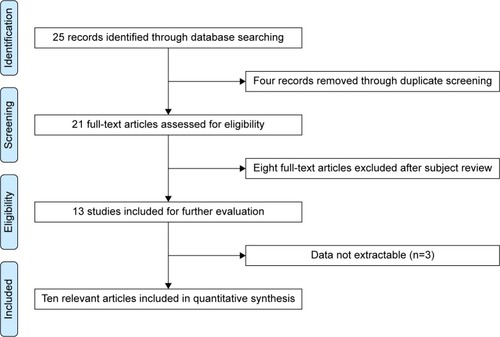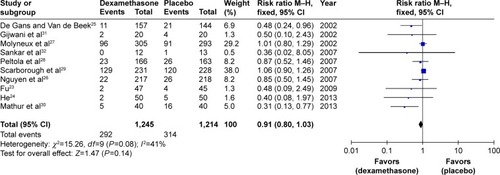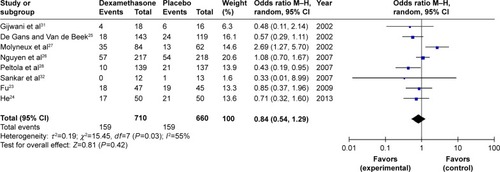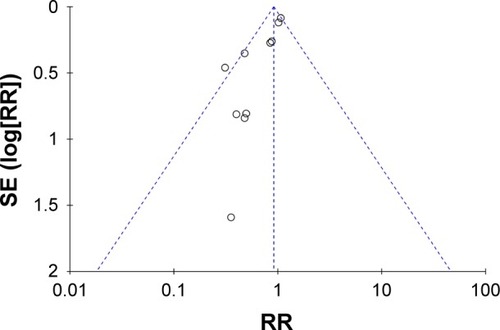Abstract
Background
Bacterial meningitis is a serious infection in children and adults worldwide, with considerable morbidity, mortality, and severe neurological sequelae. Dexamethasone is often used before antibiotics in cases of this disease, and improves outcomes.
Objective
Although several studies have identified the role of adjunctive dexamethasone therapy in the treatment of bacterial meningitis, the results are still inconclusive. The aim of this study was to systematically evaluate the therapeutic and adverse effect of adjunctive dexa-methasone in patients with bacterial meningitis.
Materials and methods
Relevant randomized, double-blind, placebo-controlled trials of dexamethasone in bacterial meningitis published between 2000 and 2016 were retrieved from the common electronic databases. The odds ratio (OR) and risk ratio (RR) with their 95% confidence interval (CI) were employed to calculate the effect.
Results
A total of ten articles including 2,459 bacterial meningitis patients (1,245 in the dex-amethasone group and 1,214 in the placebo group) were included in this meta-analysis. Our result found that dexamethasone was not associated with a significant reduction in follow-up mortality (292 of 1,245 on dexamethasone versus 314 of 1,214 on placebo; OR =0.91, 95% CI =0.80–1.03, P=0.14) and severe neurological sequelae (22.4% versus 24.1%, OR =0.84, 95% CI =0.54–1.29, P=0.42). However, dexamethasone seemed to reduce hearing loss among survivors (21.2% versus 26.1%; OR =0.76, 95% CI =0.59–0.98, P=0.03). No significant difference was found between these two groups in adverse events.
Conclusion
Our results suggested that adjunctive dexamethasone might not be beneficial in the treatment of bacterial meningitis. Future studies with more data are needed to further prove the role of dexamethasone in bacterial meningitis.
Introduction
Bacterial meningitis is a serious life-threatening disease with severe neurological emergency such as hearing loss, developmental disorders, and neuropsychological impairment, occurring in up to 50% of survivors of the disease.Citation1 The clinical signs of bacterial meningitis include fever, headache, meningismus, an altered level of consciousness, and so on.Citation2 It is ranked fourth as a cause of disability, and the estimated incidence is 1–2 million cases per year worldwide.Citation3 Streptococcus pneumoniae, Haemophilus influenzae, and Neisseria meningitidis are the leading causes, still resulting in unacceptably high levels of human mortality and morbidity.Citation4 Although routine vaccination against the common pathogens has decreased the burden of disease, improved the outcomes, and had a notable effect on the prevalence of bacterial meningitis,Citation5,Citation6 due to global emergence of multidrug-resistant bacteria, an estimated 1.2 million cases occur worldwide every year and 180,000 deaths in children aged 1–59 months were reported in 2010.Citation7,Citation8 In addition, bacterial meningitis often causes hearing loss and is fatal in 5%–40% of children and 20%–50% of adults despite treatment with adequate antibiotics.Citation9 Early diagnosis and rapid initiation of empiric antimicrobial and adjunctive therapy are vital. Therefore, therapy should be initiated as soon as blood cultures have been obtained, preceding any imaging studies.
Corticosteroids, which have metabolic and regulatory functions in humans, are a class of steroid hormones that are produced in the adrenal cortex of vertebrates and the synthetic analogs of these hormones. They are implicated in a wide range of physiological processes such as stress response, immune response, inflammation regulation, carbohydrate metabolism, and protein catabolism.Citation10 Corticosteroids can also attenuate the intrathecal inflammatory response caused by infection and are used as an adjunct to antibiotics in the treatment of bacterial meningitis, reducing the mortality and morbidity.Citation11 Dexamethasone is a type of corticosteroid medication.Citation12,Citation13 The use of dexamethasone was significantly associated with improved cancer-related fatigue and quality of life.Citation14 Dexamethasone therapy has been implemented as adjunctive treatment for bacterial meningitis and is correlated with a lower mortality and fewer neurological and auditory sequelae in adults and children.Citation15 Moreover, the adjunctive dexamethasone therapy can improve survival for years in the acute phase in adults with community-acquired bacterial meningitis.Citation16
Although several studies have shown that dexametha-sone was used as a complementary therapy to antibacterials, it is still not clear whether it is effective in the treatment of bacterial meningitis because of the disparate findings from clinical trials and clinical evidence,Citation17 and empirical use of dexamethasone in bacterial meningitis appears controversial.Citation18,Citation19 Borchorst and MøllerCitation20 found that dexamethasone treatment might be correlated with lower mortality and fewer neurological and auditory sequelae in adults and children from high-income countries, especially in adults suffering from pneumococcal meningitis. However, Peterković et alCitation21 did not substantiate the reported benefits of adjunctive dexamethasone in adult bacterial meningitis based on 20 years of experience in daily practice. Therefore, we conducted this meta-analysis to systematically evaluate the role of dexamethasone in bacterial meningitis.
Materials and methods
Literature search
The electronic databases of PubMed, Embase, Medline, and the Chinese biomedicine literature were used to retrieve relevant articles published between January 2000 and 2016. The MeSH terms were “bacterial meningitis”, “dexamethasone or corticosteroids”, “treatment or therapy”, and their combinations. We also manually searched the references of retrieved articles to obtain more resources. We considered only those studies that were written in English and Chinese.
Inclusion criteria
The eligible articles must meet the following criteria: 1) randomized, double-blind, placebo-controlled trials of dexamethasone in the treatment of bacterial meningitis; 2) the diagnosis of bacterial meningitis was accepted in the presence of positive cerebrospinal fluid (CSF) culture, positive blood culture, positive latex agglutination test, or suggestive CSF cytology and biochemical profile;Citation22 3) the primary outcomes were death at the time of first follow-up, severe neurological sequelae at first follow-up, and severe bilateral hearing loss at first follow-up; and 4) the search was focused on studies that had been conducted in humans.
Data extraction
Two of our authors independently assessed the quality of the included studies based on the descriptions provided by the authors of the included trials. Any disagreement was subsequently resolved by discussion with a third author to reach a final consensus on each item. The following information was extracted from each included article: the name of first author, year of publication, country, study period, age range, sample size, diagnostic criteria, dexamethasone dose, and primary outcomes.
Statistical analyses
Statistical analyses were conducted in Review Manager (Version 5.2, The Cochrane Collaboration). The overall effect was measured by odds ratios (ORs) and risk ratios (RRs) with their 95% confidence interval (CI). The significance of the pooled ratios was determined by the Z-test with a P-value <0.05 considered statistically significant. The I2 test and the Q-statistic test were employed to calculate the between-study heterogeneity. The fixed-effect model was used when the P-value for the Q-test was >0.10 and I2 for the I2 test was <50%; otherwise, the random-effect model was used when the effect was heterogeneous. The evidence of publication bias was assessed by visual funnel plot inspection. The sensitivity analysis was used to assess whether our results were substantially influenced by the presence of any individual study.
Results
Characteristics of included studies
After applying the inclusion criteria, a total of ten articles were finally screened out, including 2,459 patients (1,245 in the dexamethasone group and 1,214 in the placebo group) with bacterial meningitis. presents the process of literature search. The ten articles (two were written in ChineseCitation23,Citation24 and eight in EnglishCitation25–Citation32) were conducted in six countries (the Netherlands, India, Malawi, Vietnam, Brazil, and the People’s Republic of China). All the patients were confirmed by clinically suspected bacterial meningitis plus CSF or blood criteria. The characteristics of the studies included in this analysis are listed in .
Table 1 Main characteristics of included studies in this meta-analysis
Curative effect analysis of dexamethasone in the treatment of bacterial meningitis
Follow-up mortality
All the ten articles reported the follow-up mortality of dexamethasone in the treatment of bacterial meningitis. No significant between-study heterogeneity was observed, and the fixed-effect model was used. Overall, we found that the frequency of follow-up mortality in the dexamethasone group was a little lower than that in the placebo group (23.5% versus 25.9%), but the statistical analysis proved that dexametha-sone was not associated with a significant reduction in death (OR =0.91, 95% CI =0.80–1.03, P=0.14) as shown in . Subgroup analysis by age group showed that dexamethasone was not correlated with follow-up mortality reduction either in adults (OR =0.93, 95% CI =0.79–1.09, P=0.39) or in children (OR =0.88, 95% CI =0.71–1.08, P=0.22).
Hearing loss
Nine articles reported the incidence of hearing loss. Our result found that the frequency of hearing loss in the dexa-methasone group was lower than that in the placebo group (21.2% versus 26.1%), and the statistical analysis found that dexamethasone was associated with a significant reduction in hearing loss (OR =0.76, 95% CI =0.59–0.98, P=0.03) as shown in .
Neurological sequelae
Eight articles considered the role of dexamethasone in severe neurological sequelae of patients with bacterial meningitis. Our result demonstrated that dexamethasone was not associated with a significant reduction in severe neurological seque-lae (22.4% versus 24.1%, OR =0.84, 95% CI =0.54–1.29, P=0.42) in the random-effect model as shown in .
Adverse effect
Adverse events included gastrointestinal bleeding, hyperglycemia, hydrocephalus, blindness, second fever, and so on. These adverse events showed no significant difference between the dexamethasone group and the placebo group (P>0.05).
Sensitivity analysis and publication bias
We conducted a sensitivity analysis by systematically removing each study and recalculating the significance of the result to confirm whether each study influenced the overall results. Our result found that the pooled RRs and ORs were not significantly changed. The funnel plots were used to evaluate the publication bias. All the plots were found to be roughly symmetrical, indicating no publication bias as shown in .
Discussion
In this meta-analysis, we totally screened out ten articles, including 2,459 patients. Our result found that dexamethasone was not associated with a significant reduction in follow-up mortality (P=0.14) and severe neurological sequelae (P=0.42). However, dexamethasone seemed to reduce hearing loss among survivors (P=0.03). No significant difference was found between these two groups in adverse events. Our results were consistent with those of previous meta-analysis, which showed that adjunctive dexamethasone in the treatment of acute bacterial meningitis did not seem to significantly reduce death or neurological disability but reduced the hearing loss among survivors.Citation33
Bacterial meningitis is a severe acute infectious disease. The intense inflammatory host’s response is potentially fatal and contributes to the neurological sequelae. The poor outcomes are mainly due to secondary systemic and intracranial complications resulting from a consequence of the inflammatory response to the invading pathogen and release of bacterial components by the pathogen itself.Citation34 The inflammatory reaction involving the meninges, the subarach-noid space, and the brain parenchymal vessels was shown to contribute to neuronal injury.Citation35 The harmful inflammatory response is initiated by the recognition of bacterial products through pattern recognition receptors.Citation36 Despite effective antimicrobial therapy, the morbidity and mortality still remain high. Adequate and prompt treatment of bacterial meningitis is critical to outcome.
Dexamethasone is used to treat many inflammatory and autoimmune conditions. It can trigger a wide cellular response modulating the expression of genes involved in the innate immune system, growth, and stress and increases susceptibility to bacterial disease.Citation37 High-dose dexamethasone was shown to modulate serum cytokine profile in patients with primary immune thrombocytopenia.Citation38 Dexamethasone is often administered before antibiotics in cases of bacterial meningitis. It then acts to reduce the inflammatory response of the body to the bacteria killed by the antibiotics (bacterial death releases proinflammatory mediators that can cause a response that is harmful to the patient), thus improving prognosis and outcome.Citation39
Many studies have identified the role of dexamethasone in the treatment of bacterial meningitis. However, the results still remain inconclusive. Bodilsen et alCitation40 proved that patients treated with dexamethasone were more likely to have a favorable outcome. Baunbæk-Knudsen et alCitation41 indicated that adjuvant corticosteroid treatment in acute bacterial meningitis improved the outcome and could safely be administered in an elderly population with high levels of immunosuppressive comorbidity. Heckenberg et alCitation42 suggested that adjunctive dexamethasone was widely prescribed for patients with meningococcal meningitis, was not associated with harm, and the rate of arthritis had decreased after the implementation of dexamethasone. Weisfelt et alCitation43 showed that treatment with adjunctive dexamethasone was not associated with an increased risk for long-term cognitive impairment. Brouwer et alCitation44 demonstrated that the corticosteroid dexamethasone did not significantly reduce the death rate, but patients treated with corticosteroids had significantly lower rates of severe hearing loss, any hearing loss, and neurological sequelae.
The combination of dexamethasone plus other antibodies might be the new treatment strategy for patients with bacterial meningitis. Kasanmoentalib et alCitation45 found that adjunc-tive treatment with dexamethasone plus anti-C5 antibodies improved the survival in severe experimental meningitis caused by S. pneumoniae serotype 3. Vivas et alCitation46 showed that low-dose daptomycin was affected by concomitant use of dexamethasone, suggesting that the combination appeared to be a good choice for the treatment of pneumococcal meningitis. Du et alCitation47 suggested that dexamethasone could downregulate the expression of AQP4 in the brain tissue of rats with meningitis and provided evidence for the mechanism of protective effect of dexamethasone on the central nervous system.
Dexamethasone may also have some adverse effect in the treatment of bacterial meningitis. Leib et alCitation48 demonstrated that dexamethasone as adjuvant therapy increased hippocam-pal cell injury and reduced learning capacity in the model of pneumococcal meningitis in infant rats. Spreer et alCitation49 found that dexamethasone increased the rate of apoptotic neurons in the granular layer of the hippocampal dentate gyrus in rabbits with Escherichia coli meningitis.
There were several limitations in our present meta-analysis. First, the event numbers of each included study were too small to show whether results were positive or negative. Second, dex-amethasone in the treatment of bacterial meningitis was all short-course therapy, thus less side effects were reported. Third, the performance of adjunctive therapy with dexa methasone in bacterial meningitis was shown to be dependent on circumstances;Citation50 therefore, other related factors should be considered. Finally, the dexamethasone dose and empiric antibiotic therapy were different in each study, which may have influenced our results.
Conclusion
Our results indicated that patients with bacterial meningitis neither benefit from nor are harmed by treatment with adjunc-tive dexamethasone. Future well-designed, large-sample studies are still needed to further evaluate the role of dexa-methasone in the treatment of bacterial meningitis.
Disclosure
The authors report no conflicts of interest in this work.
References
- HeckenbergSGBrouwerMCvan de BeekDBacterial meningitisHandb Clin Neurol20131211361137524365425
- Van de BeekDde GansJSpanjaardLWeisfeltMReitsmaJBVermeulenMClinical features and prognostic factors in adults with bacterial meningitisN Engl J Med2004351181849185915509818
- CastelblancoRLLeeMHasbunREpidemiology of bacterial meningitis in the USA from 1997 to 2010: a population-based observational studyLancet Infect Dis201414981381925104307
- NamaniSMilenkovicZKucharEKociRMehmetiMMortality from bacterial meningitis in children in KosovoJ Child Neurol2012271465021765151
- McIntyrePBO’BrienKLGreenwoodBvan de BeekDEffect of vaccines on bacterial meningitis worldwideLancet201238098541703171123141619
- GlimåkerMJohanssonBGrindborgÖBottaiMLindquistLSjölinJAdult bacterial meningitis: earlier treatment and improved outcome following guideline revision promoting prompt lumbar punctureClin Infect Dis20156081162116925663160
- van de BeekDProgress and challenges in bacterial meningitisLancet201238098541623162423141602
- van de BeekDBrouwerMCThwaitesGETunkelARAdvances in treatment of bacterial meningitisLancet201238098541693170223141618
- Rodenburg-VlotMBRuytjensLOostenbrinkRGoedegebureAvan der SchroeffMPSystematic review: incidence and course of hearing loss caused by bacterial meningitis: in search of an optimal timed audiological follow-upOtol Neurotol20163711826649601
- GrantPCoumarin anticoagulants and endocrine interactionsCoumarin Anticoagulant Research Progress2008111
- ShinMDexamethasone in bacterial meningitisEthics20158330903096
- Cáceres-del-CarpioJDonato CostaRHaiderANarayananRKuppermannBDCorticosteroids: Triamcinolone, Dexamethasone and FluocinoloneDev Ophthalmol20165522123126502207
- Pukkila-WorleyRDexamethasone/prednisoneReactions2015155293
- FrancoMWilliamLPoonPAzadADexamethasone for cancer-related fatigueJ Clin Oncol201432660860924419135
- OgunlesiTAOdigweCCOladapoOTAdjuvant corticosteroids for reducing death in neonatal bacterial meningitisCochrane Database Syst Rev201511CD01043526560739
- FritzDBrouwerMCvan de BeekDDexamethasone and long-term survival in bacterial meningitisNeurology201279222177217923152589
- EspositoSSeminoMPicciolliIPrincipiNShould corticosteroids be used in bacterial meningitis in children?Eur J Paediatr Neurol2013171242822789668
- PfauslerBSchmutzhardEControversies in neurology, Vienna, 2012: steroids in bacterial meningitis: noJ Neural Transm (Vienna)2013120234334623263539
- BenningerFSteinerISteroids in bacterial meningitis: yesJ Neural Transm (Vienna)2013120233934223238974
- BorchorstSMøllerKThe role of dexamethasone in the treatment of bacterial meningitis-a systematic reviewActa Anaesthesiol Scand201256101210122122524556
- PeterkovićVTrkuljaVKutlešaMKrajinovićVLepurDDexamethasone for adult community-acquired bacterial meningitis: 20 years of experience in daily practiceJ Neurol2012259222523621706150
- LeibSLBoscacciRGratzlOZimmerliWPredictive value of cere-brospinal fluid (CSF) lactate level versus CSF/blood glucose ratio for the diagnosis of bacterial meningitis following neurosurgeryClin Infect Dis1999291697410433567
- FuXDexamethasone in adolescents and adults with bacterial meningitisChina Pract Med20094128283
- HeYClinical observation of adjuvant dexamethasone in treatment of childhood bacterial meningitisChina Foreign Med Treat201332309192
- De GansJVan de BeekDEuropean Dexamethasone in Adulthood Bacterial Meningitis Study InvestigatorsDexamethasone in adults with bacterial meningitisN Engl J Med2002347201549155612432041
- NguyenTHTranTHThwaitesGDexamethasone in Vietnam-ese adolescents and adults with bacterial meningitisN Engl J Med2007357242431244018077808
- MolyneuxEMWalshALForsythHDexamethasone treatment in childhood bacterial meningitis in Malawi: a randomised controlled trialLancet2002360932821121812133656
- PeltolaHRoineIFernándezJAdjuvant glycerol and/or dexamethasone to improve the outcomes of childhood bacterial meningitis: a prospective, randomized, double-blind, placebo-controlled trialClin Infect Dis200745101277128617968821
- ScarboroughMGordonSBWhittyCJCorticosteroids for bacterial meningitis in adults in sub-Saharan AfricaN Engl J Med2007357242441245018077809
- MathurNBGargAMishraTKRole of dexamethasone in neonatal meningitis: a randomized controlled trialIndian J Pediatr201380210210723054852
- GijwaniDKumharMRSinghVBDexamethasone therapy for bacterial meningitis in adults: a double blind placebo control studyNeurol India2002501636711960154
- SankarJSinghiPBansalARayPSinghiSRole of dexamethasone and oral glycerol in reducing hearing and neurological sequelae in children with bacterial meningitisIndian Pediatr200744964965617921553
- van de BeekDFarrarJJde GansJAdjunctive dexamethasone in bacterial meningitis: a meta-analysis of individual patient dataLancet Neurol20109325426320138011
- WoehrlBKleinMGrandgirardDKoedelULeibSBacterial meningitis: current therapy and possible future treatment optionsExpert Rev Anti Infect Ther20119111053106522029523
- BarichelloTFagundesGDGenerosoJSEliasSGSimõesLRTeixeiraALPathophysiology of neonatal acute bacterial meningitisJ Med Microbiol201362pt 121781178923946474
- KoedelUKleinMPfisterH-WPetersonPKToborekMImmunopathogenesis of bacterial meningitis Neuroinflammation and NeurodegenerationNew YorkSpringer2014387404
- Salas-LeitonECosteOAsensioEInfanteCCañavateJPManchadoMDexamethasone modulates expression of genes involved in the innate immune system, growth and stress and increases susceptibility to bacterial disease in Senegalese sole (Solea senegalensis Kaup, 1858)Fish Shellfish Immunol201232576977822326938
- ZhanYZouSHuaFHigh-dose dexamethasone modulates serum cytokine profile in patients with primary immune thrombocytopeniaImmunol Lett20141601333824657323
- van de BeekDde GansJMcIntyrePPrasadKCorticosteroids for acute bacterial meningitisCochrane Database Syst Rev20071CD00440517253505
- BodilsenJDalager-PedersenMSchønheyderHCNielsenHDexamethasone treatment and prognostic factors in community-acquired bacterial meningitis: a Danish retrospective population-based cohort studyScand J Infect Dis201446641842524645971
- Baunbæk-KnudsenGSøllingMFarreABenfieldTBrandtCTImproved outcome of bacterial meningitis associated with use of corticosteroid treatmentInfect Dis (Lond) Epub20151111
- HeckenbergSGBrouwerMCvan der EndeAvan de BeekDAdjunctive dexamethasone in adults with meningococcal meningitisNeurology201279151563156922972648
- WeisfeltMHoogmanMvan de BeekDde GansJDreschlerWASchmandBADexamethasone and long-term outcome in adults with bacterial meningitisAnn Neurol200660445646816958121
- BrouwerMCMcIntyrePPrasadKvan de BeekDCorticosteroids for bacterial meningitisHealth20136CD004405
- KasanmoentalibESValls SeronMMorganBPBrouwerMCvan de BeekDAdjuvant treatment with dexamethasone plus anti-C5 antibodies improves outcome of experimental pneumococcal meningitis: a random-ized controlled trialJ Neuroinflammation201512114926272468
- VivasMForceETubauFEl HajCArizaJCabellosCEffect of dexamethasone on the efficacy of daptomycin in the therapy of experimental pneumococcal meningitisInt J Antimicrob Agents2015461283225813395
- DuKXDongYZhangYEffects of dexamethasone on aquaporin-4 expression in brain tissue of rat with bacterial meningitisInt J Clin Exp Pathol2015833090309626045822
- LeibSLHeimgartnerCBifrareYDLoefflerJMTäuberMGDexamethasone aggravates hippocampal apoptosis and learning defi-ciency in pneumococcal meningitis in infant ratsPediatr Res200354335335712788989
- SpreerAGerberJHanssenMDexamethasone increases hip-pocampal neuronal apoptosis in a rabbit model of Escherichia coli meningitisPediatr Res200660221021516864706
- PeltolaHLeibSLPerformance of adjunctive therapy in bacterial meningitis depends on circumstancesPediatr Infect Dis J201332121381138224569310





